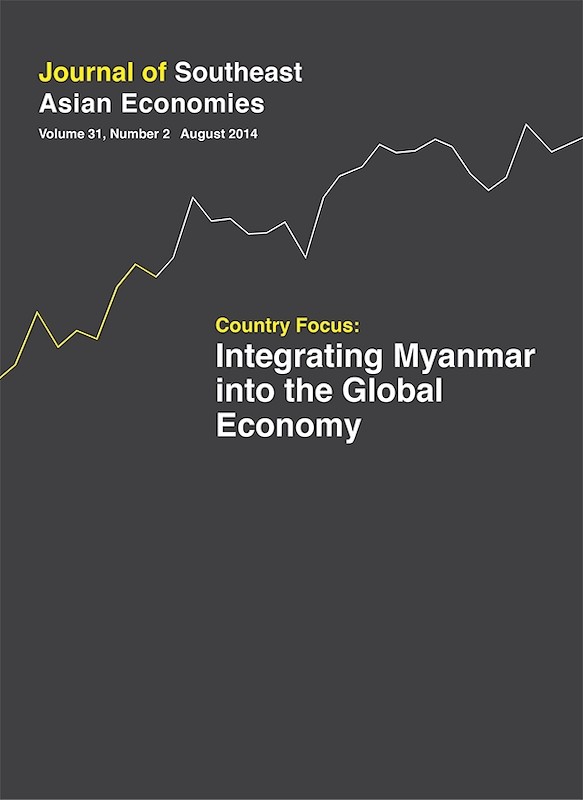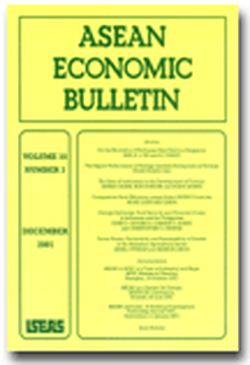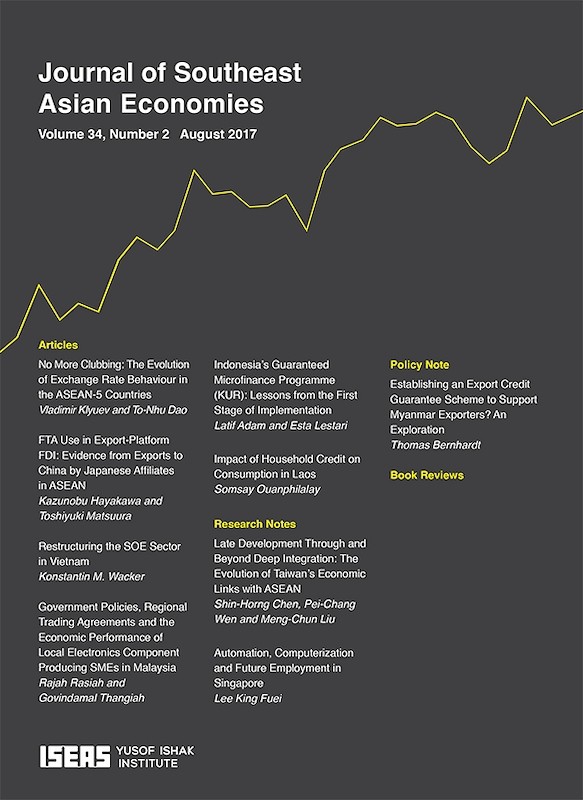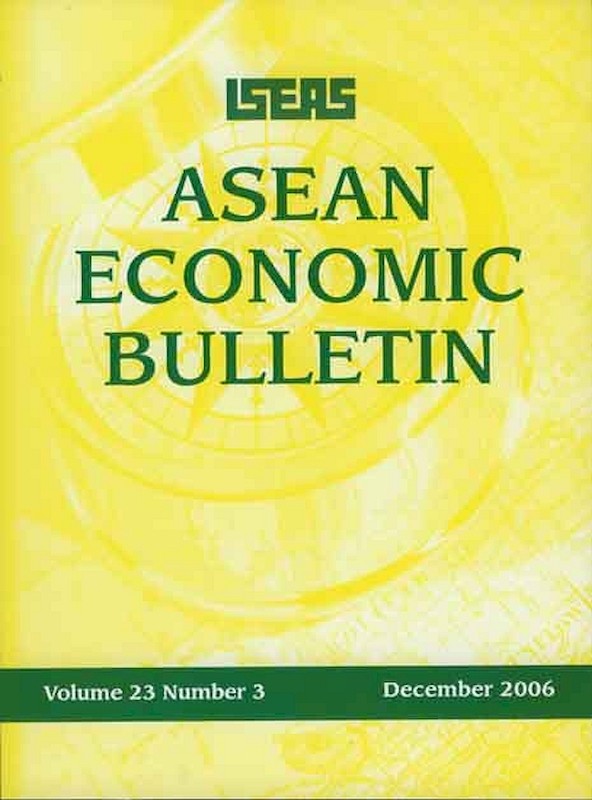ASEAN Economic Bulletin Vol. 27/3 (Dec 2010)
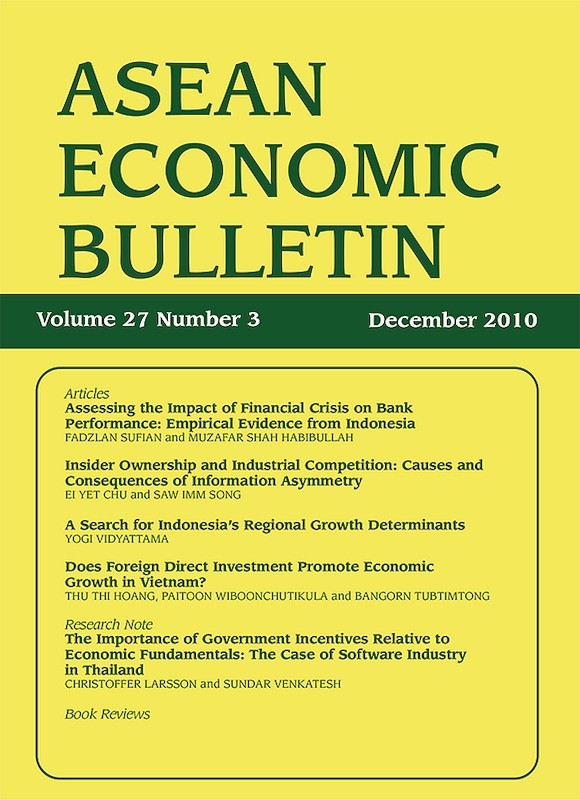
Date of publication:
December 2010
Publisher:
Institute of Southeast Asian Studies
Number of pages:
96
Code:
AE27/3
Contents
-
ASEAN Economic Bulletin Vol. 27/3 (Dec 2010)
[Whole Publication] -
Preliminary pages
- ARTICLES
-
Assessing the Impact of Financial Crisis on Bank Performance:Empirical Evidence from Indonesia, by Fadzlan Sufian, Muzafar Shah Habibullah, authors see abstractThe paper seeks to examine the determinants of Indonesian banks profitability during the period 19902005. The empirical findings indicate that income diversification and capitalization are positively related to bank profitability, while size and overhead costs exert negative impacts. During the period under study, Indonesian banks seem to have been skimping on their resources, particularly during the pre-crisis and crisis periods. The impact of economic growth and banking sector concentration are positive during the pre-crisis and crisis periods. We find that the Asian financial crisis exerts negative and significant impact on the profitability of Indonesian banks, while Indonesian banks have been relatively more profitable during the pre-crisis compared to the post-crisis and crisis periods.
-
Insider Ownership and Industrial Competition: Causes and Consequences of Information Asymmetry, by Ei Yet Chu, Saw Imm Song, authors see abstractThe study focuses on the causes and consequences of information asymmetry. Using a sample of 180 Malaysian manufacturing firms, the findings show that insiders and industrial competition contribute to the problem of information asymmetry. The presence of large shareholders as insiders in low competitive industries further aggravates the problem. Although to a certain degree minority shareholders in low competitive industries also share some benefits of monopolistic rents, insiders are found to be accelerating information asymmetry to protect their personal interests, which subsequently cause share returns to diminish. Consequently, we found that the relationship between information asymmetry and share returns is negative. The findings show that insiders and industrial competition have implications for corporate governance and stock market liquidity policies.
-
A Search for Indonesia's Regional Growth Determinants, by Yogi Vidyattama, author see abstractThe discussion on income disparity among regions has emphasized the need for research in finding Indonesia's regional growth determinants. This study investigates the determinants of Indonesia's provincial growth of income per capita and discusses some issues related to the appropriate regional growth model estimation that utilizes GMM dynamic panel estimation. Gross regional domestic product (GRDP) per capita is the income proxy in this study, while several indicators, such as trade openness, infrastructure, and local government spending, serve as factors for growth. These are also supported by the usual determinants such as investment, human capital and population growth. The result points at transportation infrastructure, trade openness and human capital as important provincial growth determinants.
-
Does Foreign Direct Investment Promote Economic Growth in Vietnam?, by Thu Thi Hoang, Paitoon Wiboonchutikula, Bangorn Tubtimtong, authors see abstractThis study examines the effects of the foreign direct investment (FDI) on economic growth in Vietnam by using the panel data model across Vietnam's sixty-one provinces in 19952006. The study shows that there is a strong and positive effect of FDI on economic growth in Vietnam as a channel of increasing the stock of capital. Human capital and trade in Vietnam are not yet the channels that give access to advance technology and knowledge transfers from FDI inflows to increase Vietnam's economic growth.
- RESEARCH NOTE
-
The Importance of Government Incentives Relative to Economic Fundamentals: The Case of Software Industry in Thailand, by Christoffer Larsson, Sundar Venkatesh, authors see abstractStudies on industrial clustering identify factors that nourish the clustering and thus aid in industrial development. We classify these as government incentives and economic fundamentals. Economic fundamentals, which we define as a set of essential factors conducive to the development of an industry cluster, may be the result of chance - for instance, geographical location and climate or may be a result of long term government policies such as affordable and abundant higher education. We examine the importance of government incentives relative to the economic fundamentals in the development of the software services industry in Thailand. Our survey of investors, both foreign and domestic, in the software services industry in Thailand, found that economic fundamentals were perceived as being more important than government incentives in influencing investment decisions. This raises important questions for government policy. For example, is money used for tax breaks and grants efficiently spent? Or, could the money be better invested in improving the quality of human resources and infrastructure? Based on the findings of this study, recommendations are proposed for government policy and directions for future research.
- BOOK REVIEWS
-
BOOK REVIEW: Tiger Economies Under Threat: A Comparative Analysis of Malaysias Prospects and Policy Options, by Shahid Yusuf and Kaoru Nabeshima., by Anthony L Smith, author
-
BOOK REVIEW: The Singapore Economy: An Econometric Perspective, by Tilak Abeysinghe and Keen Meng Choy, by Aekapol Chongvilaivan, author
-
BOOK REVIEW: East Asian Regionalism, by Christopher M. Dent, by Robert L Curry, Jr., author
-
BOOK REVIEW: Going Local: Decentralization, Democratization, and the Promise of Good Governance, by Merilee S. Grindle., by Francis E Hutchinson, author


